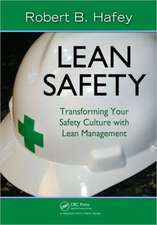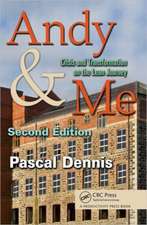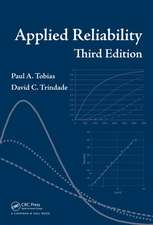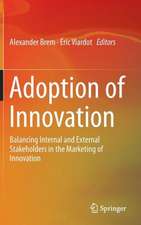Research Collaboration and Team Science: A State-of-the-Art Review and Agenda: SpringerBriefs in Entrepreneurship and Innovation
Autor Barry Bozeman, Craig Boardmanen Limba Engleză Paperback – 2 iun 2014
Broadly speaking, STHC is the sum of scientific and technical and social knowledge, skills and resources embodied in a particular individual. It is both human capital endowments, such as formal education and training and social relations and network ties that bind scientists and the users of science together. STHC includes the human capital which is the unique set of resources the individual brings to his or her own work and to collaborative efforts. Generally, human capital models have developed separately from social capital models, but in the practice of science and the career growth of scientists, the two are not easily disentangled.
Using a multi-factor model, the book explores various factors affecting collaboration outcomes, with particular attention on institutional factors such as industry-university relations and the rise of large-scale university research centers.
Preț: 441.85 lei
Nou
Puncte Express: 663
Preț estimativ în valută:
84.55€ • 88.51$ • 69.96£
84.55€ • 88.51$ • 69.96£
Carte tipărită la comandă
Livrare economică 07-21 aprilie
Preluare comenzi: 021 569.72.76
Specificații
ISBN-13: 9783319064673
ISBN-10: 3319064673
Pagini: 100
Ilustrații: VIII, 66 p. 1 illus.
Dimensiuni: 155 x 235 x 7 mm
Greutate: 0.12 kg
Ediția:2014
Editura: Springer International Publishing
Colecția Springer
Seria SpringerBriefs in Entrepreneurship and Innovation
Locul publicării:Cham, Switzerland
ISBN-10: 3319064673
Pagini: 100
Ilustrații: VIII, 66 p. 1 illus.
Dimensiuni: 155 x 235 x 7 mm
Greutate: 0.12 kg
Ediția:2014
Editura: Springer International Publishing
Colecția Springer
Seria SpringerBriefs in Entrepreneurship and Innovation
Locul publicării:Cham, Switzerland
Public țintă
ResearchCuprins
Chapter 1 Assessing Research Collaboration Studies: A Framework for Analysis.- Chapter 2 Inputs, Resources and Research Collaboration.- Chapter 3 Processes and Activities in Research Collaboration.- Chapter 4 The Outputs, Outcomes and Impacts of Research Collaboration.- Chapter 5 Effectiveness Questions and Research Recommendations.
Notă biografică
Barry Bozeman is Arizona Centennial Professor of Technology Policy and Public Management, Arizona State University. His research focuses on science and technology policy and its management. He is the author of several publications on these topics. Bozeman previously served as Ander Crenshaw Chair at University of Georgia and Regents’ Professor at Georgia Tech. He was founding director of the Maxwell School’s Center for Technology and Information Policy at Syracuse University. He is a fellow of both the American Association for the Advancement of Science and the National Academy of Public Administration.
Craig Boardman is Associate Professor in the John Glenn School of Public Affairs, The Ohio State University and Associate Director of the Battelle Center for Science & Technology Policy, Columbus, Ohio. His research focuses on science and technology policy and organizational theory. His recent work in this area includes an edited volume on the operations and performance of university-industry research centers entitled Cooperative Research Centers and Technical Innovation: Government Policies, Industry Strategies and Organizational Dynamics (Springer 2013).
Craig Boardman is Associate Professor in the John Glenn School of Public Affairs, The Ohio State University and Associate Director of the Battelle Center for Science & Technology Policy, Columbus, Ohio. His research focuses on science and technology policy and organizational theory. His recent work in this area includes an edited volume on the operations and performance of university-industry research centers entitled Cooperative Research Centers and Technical Innovation: Government Policies, Industry Strategies and Organizational Dynamics (Springer 2013).
Caracteristici
Identifies ways in which research can improve public policy for collaboration and project-level management of collaborations Develops a multi-factored model using Scientific and Technical Human Capital (STHC) theory as a point of departure Explores various factors affecting collaboration outcomes, with particular attention to institutional factors such as industry-university relations and the rise of large-scale university research centers Includes supplementary material: sn.pub/extras
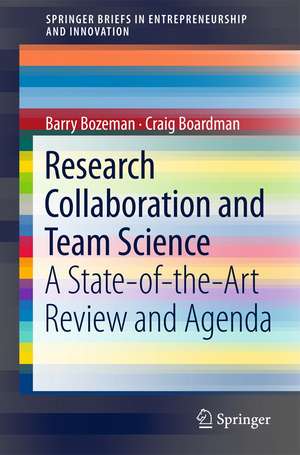





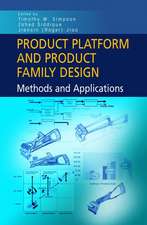
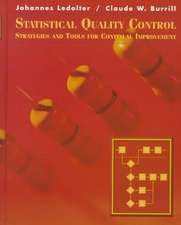

![Using Hoshin Kanri to Improve the Value Stream [With CDROM]: From Theory to Practice](https://i3.books-express.ro/bt/9781420084238/using-hoshin-kanri-to-improve-the-value-stream-with-cdrom.jpg)





